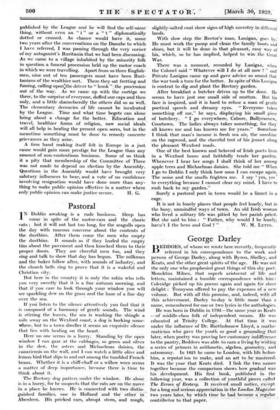Pastoral
IN Dublin awaking is a rude business. Sleep has come in spite of the motor-cars and the choric cats ; but it will not last too long, for the seagulls open the day with raucous converse about the contents of the dustbins. After them come the men who empty the dustbins. It sounds as if they hurled the empty . tins about the pavement and then knocked them to their proper doors. They are cheerful men too, and they sing and talk to show that day has begun. The milkman and the baker folio* after, with sounds of industry, and the church bells ring to prove that it is a wakeful and Christian city.
But here in the country it is only the robin who tells you very sweetly that it is a ,fine autumn morning, and that if you care to look through your window you will • see sparkling dew on the grass and the haze of a fine day over the sea.
If yoti- listen to the silence attentively you find that it is composed of a harmony of gentle sounds. The wind is stirring the leaves, the sea is washing the shingle a mile away on the Wexford coast, a dog is barking some where, but to a town dweller it seems an exquisite silence that lies with healing on the heart.
Here no one seems in a hurry: Standing. by the open window I can gaze at the cabbages, so green and silver in _ the dew, the asters and Michaelmas daisies, the . canariensis on the wall, and I can watch a little olive and lemon bird that slips in and out among the tumbled French •• beans. Whether it is a chiff-chaff or a willow wren seems a matter of deep importance, because there is time to think about it.
The Wetory dog patters under the window. He alone .
is in a hurry, for he suspects that the rats are on the move. in a place he knows. He is connected with two distin-_ guished families, one in Holland and the • other . iri Aberdeen. His pricked ears, abrupt stern, and rough, slightly:salted coat show signs of high ancestry 'in di fferen4 lands.
With slow step the Rector's man, Lanigan, goes by.. He must Work the pump and clean the family 'boots and. shoes, but it will be done in that pleasant,. easy way of his, which, "so he has implied, helped to win" the Great War.
There was a moment, recorded by Lanigan,' when the Colonel said " Whatever will I do at all now ? " and Private Lanigan cane up and gave advice so sound that the war took a turn for the better. In spite of this Lanigan is content to dig and plant the Rectory garden.
After breakfast a butcher drives up to the door. He seems to have just one small side of mutton. But his face is inspired, and it is hard to refuse a man of gentle poetical speech and dreamy eyes. " Everyone takes something off me," he says, displaying his small piece of butchery. " I go everywhere, Cahore, Ballyearnew, Courtown. The ladies always takes something; for they • all knows me and has known me for years." Somehow I think that man's income is fresh sea air, the sunshine on the ragweed, and the cheerful trot of his jennet along the pleasant Wexford roads.
One of the best known and beloved of Irish poets lives in a Wexford home and faithfully tends' her garden. Whenever I hear her songs I shall think of her among apple trees and Michaelmas daisies. She told me " When I go to Dublin I only think how soon I can escape again. The noise and the smells frighten me. I say ' yes, yes to everything because I cannot clear my mind. I have to rush back to my garden."
Surely a pastoral poet in town would be a linnet in a cage.
It is not in lonely places that people feel lonely, but in the busy, unmindful -ways Of toWn. --An-old Irish woman who lived a solitary life was .pitied by her parish priest. But she said to him : " Father, why would I be lonely, havn't I the hens and God ? " . IV. M. LErrs.


















































 Previous page
Previous page